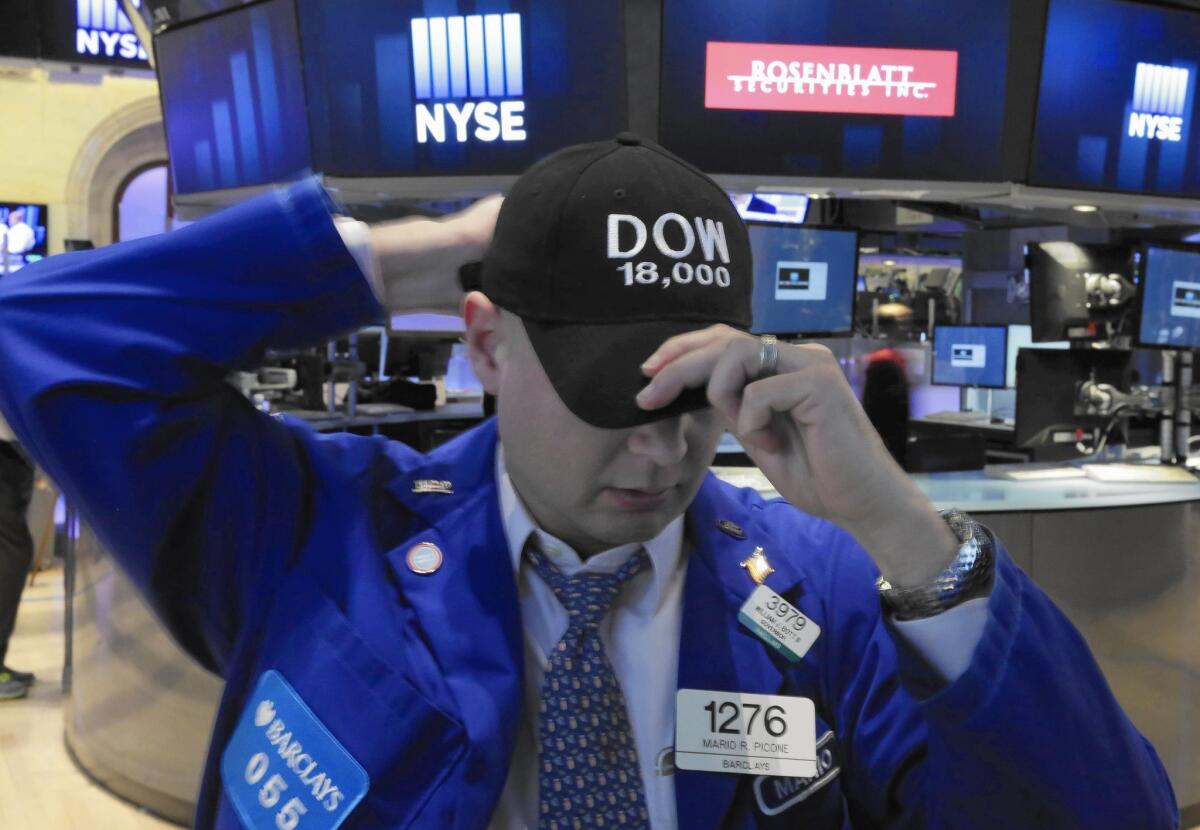Stocks soar on upbeat job-growth news

- Share via
REPORTING FROM NEW YORK — U.S. stocks soared close to the symbolic 18,000-point threshold on news of much higher-than-expected job growth last month, underscoring the nation’s strengthening economy.
Major equity indexes worldwide also shot up as investors bet that the American economic recovery was strong enough to help buoy flagging economies overseas.
“They’re all cheering us on,” said Bob Johnson, director of economic analysis for Chicago mutual-fund research firm Morningstar Inc. “They want us to buy more of their stuff.”
The blue-chip Dow Jones industrial average rose 58.69 points, or 0.3%, to a record 17,958.79. The broad-based Standard and Poor’s 500 Index gained 3.15 points, or 0.2%, to 2075.37, also a record, and the tech-heavy Nasdaq composite index rose 11.32, up 0.3%, to 4780.76.
Overseas markets reacted even more emphatically. In Germany, where a slowing growth rate threatens the weak European economy, the DAX index rose 2.4%. France’s CAC 40 rose 2.2%. The main Chinese and Japanese markets were also up.
“The reason global markets liked [the jobs report] so much is that the U.S. consumer is king,” said Chris Gaffney, senior market strategist at EverBank Wealth Management in Jacksonville, Fla. “We’re still a country that imports heavily. We’re still the country that the global economy depends on for consumption.”
Exports of goods and services made up 27% of the Chinese and French economies and 51% of the Germany economy, but only 14% of the U.S. economy, according to World Bank statistics.
The bullish U.S. stock markets have been buoyed by an array of good news, including two straight quarters of rising corporate profits and sharply declining oil prices.
The price of a gallon of regular gas has dropped 17% to $271 today from $3.26 a year ago, according to the American Automobile Assn. The saving is expected to inject billions into consumers’ wallets during holiday shopping season.
Investors also have been cheered lately by an aggressive monetary stimulus program in Japan and a widely anticipated one in Europe.
The jobs report contained plenty of good news, including an higher-than-expected 321,000 new jobs created for November and upward revisions of the two previous months’ totals by 44,000 thousand, raising the three-month average to healthy 278,000.
Even more encouraging for investors were signs that chronic U.S. wage stagnation was easing, albeit modestly, as average hourly earnings rose nine cents from October to $24.66. That was 2.1% higher than a year ago, just a notch above the rate of inflation.
Much as the world might like to think of the U.S. as the Atlas holding up the global economy, U.S. imports alone won’t be able to pull Japan out of recession or Europe back from the brink.
Part of the rise European markets can be chalked up, paradoxically, to continuing bad economic news, which in turn has spurred market expectations for European monetary officials to undertake an aggressive program of monetary stimulus akin to the massive bond-buying program recently ended by the Federal Reserve.
European Central Bank President Mario Draghi, an outspoken proponent of aggressive action, backed off a bit this week and said the bank would table a decision on such a program until early next year. That tempered market enthusiasm on both sides of the Atlantic.
Meantime, U.S. monetary officials are expected to start ending the last extraordinary stimulus measures in place from the Great Recession by raising interest rates sometime in the middle of next year.
John Lonski, chief capital markets economist for Moody’s Analytics, said the largely good news in the jobs report helped to reinforce investors expectations of a rate hike at midyear, and the perception that the U.S. economy was strong enough to power through it.
“No matter how you cut it, this is a pretty darned good report,” Lonski said. “One of the implications ... is the market’s belief that a rate hike is not about to endanger the economic recovery.”
Lonski said the recent strengthening of the dollar this year relative to most other currencies, which would make imports less expensive for consumers, also tended to allay fears the Fed would need to tighten aggressively.
The Euro, for instance, has plummeted against the dollar. It fell to $1.23 Friday from nearly $1.40 in the spring, making European goods cheaper in the U.S.
More to Read
Inside the business of entertainment
The Wide Shot brings you news, analysis and insights on everything from streaming wars to production — and what it all means for the future.
You may occasionally receive promotional content from the Los Angeles Times.











